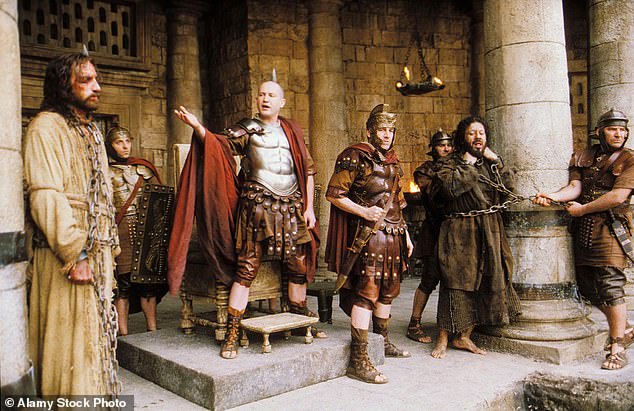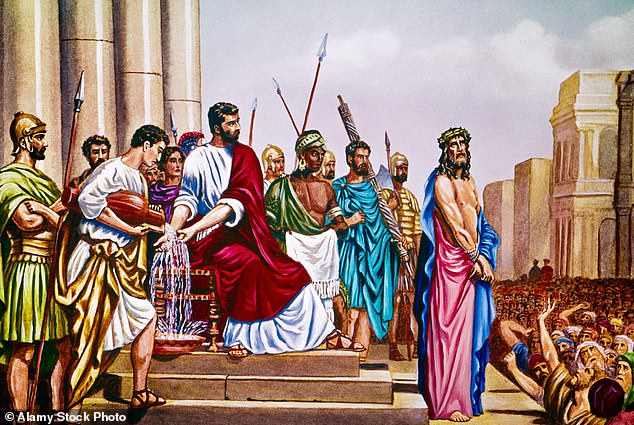This Easter Sunday, before pouncing on the chocolate eggs, let us imagine the scene in Jerusalem almost 2,000 years ago.
The city was dank from an unseasonal 24-hour storm that started on the Friday after three prisoners were crucified. The trio included Jesus of Nazareth, a charismatic preacher who had stirred fervour among blue-collar Galileans.
On the Sunday an army courier ran to the palace of Pontius Pilate, Roman governor of Judaea. His urgent message from duty command at the Antonia Fort garrison told him that Jesus’s grave was empty. There had been dawn sightings of him still alive.
‘I thought we put this Jesus to death,’ shouted Pilate, who had slept badly for two nights. ‘Who was in charge of the crucifixion squad? Double the guards on the city gates and tell King Herod there will be zero tolerance of unrest in the streets.’
‘Yes, Governor,’ said the courier, and as he left the room he raised his eyebrows to the heavens. Someone had got out of bed the wrong side this morning!
Far-fetched fantasy? Only up to a point. One of the reasons the Easter story is so compelling is that its news arc is thoroughly relatable. Churchgoers will tell you the important thing is that Jesus rose from the dead, and that is clearly core to Christian belief; but the events related by the New Testament have all the qualities of a classic power struggle.
As the Mail’s parliamentary sketch-writer I can attest that the ruling classes still behave as they did at the time of Jesus’s arrest. Supporting characters from the gospels may have died two millennia ago but their counterparts are very much with us in modern-day politics.
An angry, guilt-ridden, sleep-deprived Governor lashing out at subordinates? Today’s Whitehall is full of minor Pontius Pilates trying to wash their hands of bad decisions. Just look at the blame games going on surrounding British Steel or the finger-pointing over the Covid lockdown.

This Easter Sunday, before pouncing on the chocolate eggs, let us imagine the scene in Jerusalem almost 2,000 years ago

The city was dank from an unseasonal 24-hour storm that started on the Friday after three prisoners were crucified. The trio included Jesus of Nazareth, a charismatic preacher who had stirred fervour among blue-collar Galileans

Churchgoers will tell you the important thing is that Jesus rose from the dead, and that is clearly core to Christian belief; but the events related by the New Testament have all the qualities of a classic power struggle, writes QUENTIN LETTS
What about the sly Biblical figure of High Priest Caiaphas, who engineered Jesus’s trial?
Rabble-rousers got a crowd to demand clemency for a murderer, Barabbas, and for Jesus to be crucified in his place. Caiaphas plainly understood the dark art of today’s Westminster whips, subtle fixers who dispense disreputable tasks to lackeys and lurkers.
I have seen occasions in the Commons when backbench thugs, acting on whips’ instructions, have shouted and interrupted debates to try to make ministers change policy. The crowd scene in which Jesus is sentenced by Pilate is described by Saints Matthew, Mark, Luke and John. For my money their accounts, despite occasional differences of emphasis, read horribly true to life. Political audiences really can turn ugly on the say of a few hecklers.
Judaea was part of the Roman empire. It had regional tetrarchs (unelected nominal rulers) who were supported by the aristocratic Jewish sect of the Sadducees and by the puppet parliament of the Sanhedrin. Think, perhaps, of Britain when it was part of the European Union and the enthusiasm shown for that federal construct by our own technocratic and parliamentary elite.

On the Sunday an army courier ran to the palace of Pontius Pilate, Roman governor of Judaea. His urgent message from duty command at the Antonia Fort garrison told him that Jesus’s grave was empty. There had been dawn sightings of him still alive
The tetrarch at the time of the Crucifixion, and the figure to whom Jesus was taken after his arrest, was King Herod Antipas.
This was the son of Herod the Great, the dynamic if cruel king whose reign a generation earlier had seen a remarkable building boom. Herod Antipas – a figure who may evoke the North Korean dictator Kim Jong Un – was not half the man his father was.
He told his famous captive to perform a miracle, as if Jesus were some conjuror who did magic tricks. The king became petulant when the prisoner would not obey his demands. Scribes and pharisees (lobby journalists and human-rights lawyers in today’s parlance) wound up the king and persuaded him to send the truculent Galilean rabbi back to Pilate.
It was a classic exercise in blame avoidance. And it worked. Whom do we now blame for Jesus’s death? Pontius Pilate. Herod Antipas, like a 21st century Whitehall mandarin, had passed the buck.
Is it disrespectful to make such comparisons? Having just written a novel (entitled NUNC!) that brings a Life Of Brian-style perspective to an early chapter in Jesus’s life, I hope not.
My point is that the Bible stories are powerful because they are rooted in immutable human nature. They may tell a sacred tale, there may be the occasional angel but the action is set in a real, dusty world.
The events of Holy Week began with Jesus being cheered as he rode into Jerusalem on a colt. Today it might be an open-topped bus. The Sanhedrin and Sadducees bridled at this threat to their power and they resorted to dirty tricks. One of Jesus’s followers, Judas Iscariot, was bribed to betray his lord. He defected after being given 30 pieces of silver and blandishments that he was making a shrewd career move. Poor Judas soon wept bitter tears of remorse.

Politics is a heartless business, as many a Commons floor-crosser discovers. While it would be harsh to describe any Westminster turncoat as a Judas, it is interesting, when one encounters such people, to glimpse the fishy emptiness of their eyes, QUENTIN LETTS writes
Politics is a heartless business, as many a Commons floor-crosser discovers. While it would be harsh to describe any Westminster turncoat as a Judas, it is interesting, when one encounters such people, to glimpse the fishy emptiness of their eyes. Meeting the late Kim Philby was probably much the same. Treachery is a bleak business.
The Judaean authorities swooped in the dark, as they invariably do. Jesus was arrested while walking in the Garden of Gethsemane.
An altercation ensued and one of Caiaphas’s aides was hurt. It’s always the bodyguards who take the hit. That brawny fellow St Peter chopped off the man’s ear but no charges were pressed.
Perhaps Caiaphas knew he was on legal thin ice in depriving Jesus of his liberty. Although we may picture 1st Century Jerusalem as a tyrannous place it is notable that some dissent was tolerated. When Jesus stumbled under the weight of the cross on his way to Golgotha, a member of the public helped him. This good soul was Simon of Cyrene, and there is no record of him being reprimanded by guards.
Joseph of Arimathea paid for the burial of Jesus and even provided the tomb. Not that it was occupied for very long. Today we might call Joseph a political donor and his gift would have to be logged in a register of interests. The terminology has altered but the patterns of behaviour continue.
Was Pilate irked by so much freedom of expression in Jerusalem?

The Judaean authorities swooped in the dark, as they invariably do. Jesus was arrested while walking in the Garden of Gethsemane
As a political appointee running a tricky territory he will have been aware of a sense of drift in Rome’s power. The emperor Tiberius was an old man, soon to die. Pilate already wanted to be thought of as a hard man. An earlier chapter in St Luke’s gospel makes fleeting reference to his dealing roughly with some Galileans. Here was a governor who, to use a 20th century expression, prized ‘the smack of firm government’.
His wife sensed otherwise. She sent word to her husband – no WhatsApp in those days – that he should have nothing to do with condemning Jesus. In a dream she had ‘suffered many things’. Can we see the unnamed Mrs Pilate as a Cherie Blair figure?
Later came the moment in the graveyard when Mary Magdalene, deep in grief, saw the risen Jesus – and initially mistook him for the gardener. Such a wonderful detail.
The peace of God ‘passeth all understanding’ but the Bible’s account of Easter is so accessible, so human, you can almost feel its breath on the back of your neck.







